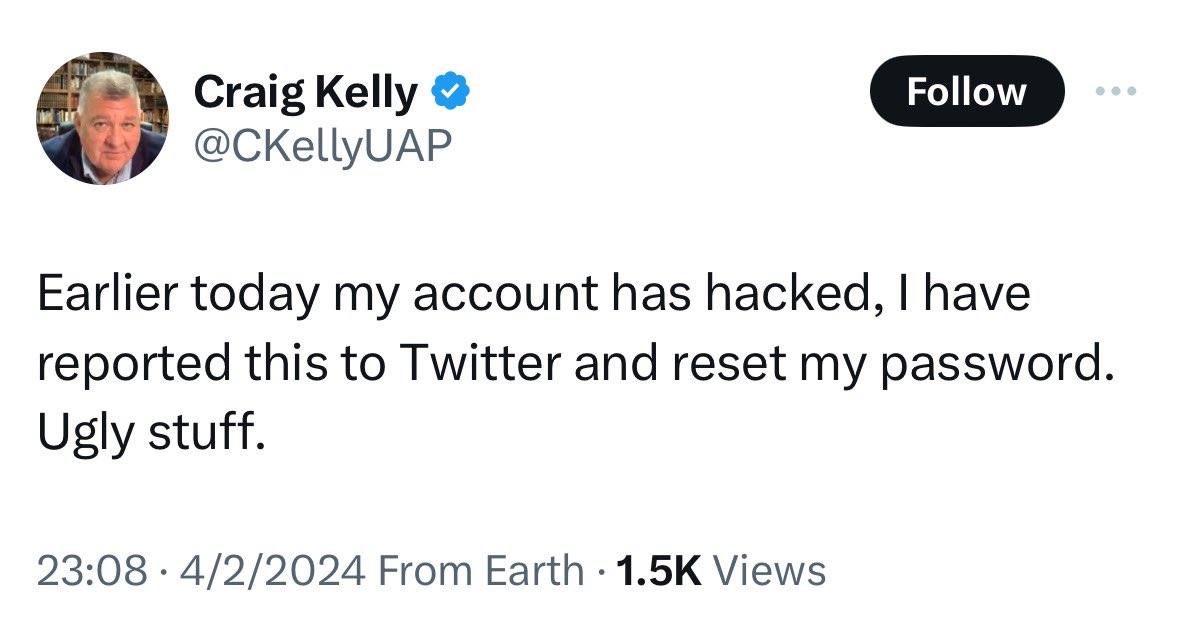
When will the madness end? When will these cyber terrorists who target blameless politicians with extremely specific hacks cease their evil-doing? Over the weekend, Craig Kelly — the inexplicably protected Liberal MP turned extremely explicable United Australia Party MP turned former both of those things — fell victim to a hacker who accessed his X (formerly Twitter) account, retweeted a single scene of hardcore pornography, and then vanished like a ghost.

Kelly was taking no chances, telling one concerned citizen that he had reported the hack and was “changing passports”. This was followed by a lot of X users pointing out that the post was still up, and reminding him that he could undo the hacker’s repost.

Kelly is not a lone victim, however, joining several politicians and political figures targeted by this very specific reign of terror.
‘I was hacked!’ — Christopher Pyne
In the early hours of November 16, 2017, the day after the successful Yes vote in the marriage equality plebiscite, then-defence industry minister Christopher Pyne’s Twitter account “liked” a tweet from an account called “XxxPornGay”, which it turns out was not a misleading name.
“Someone tried to hack my social media yesterday. Maybe they are making mischief over the plebiscite?” Pyne tweeted later that morning. There was talk of an inquiry into how this had happened, with rivals both in and out of the Liberal Party arguing such a hack of a national security portfolio could have serious implications for Australia.
For whatever reason, Pyne’s people didn’t think that that would be necessary: “The account in question was a public online social media account, not a defence, government or parliamentary social media account,” said a spokesperson at the time. “There are no defence or national security implications.”
‘Clearly a hack’ — Greg Hunt
Little did Pyne know at the time, but this was not going to be an isolated incident. Within weeks, then-health minister Greg Hunt’s account also appeared to endorse explicit content. A spokeswoman for Hunt claimed at the time that the like was “clearly” the work of a hacker.
“This was clearly a hack and has therefore been referred to the AFP,” she said. Except that in May the following year, then-AFP commissioner Andrew Colvin told a Senate estimates hearing that “the account was not hacked in a criminal sense”.
“I think social media hygiene is an issue that we all need to be very conscious of,” he added. “That is about who has access to your Twitter account, how many people have access, do you know who has access to your Twitter account? I will leave it at that.”
‘Honest mistake’ — Ted Cruz
Australia’s politicians are not the only victims, however. In 2017, Texas Senator Ted Cruz briefly brought his fractured nation together when, for 40 glorious minutes, his account registered a like on some pornography, described by The Washington Post thus:
The video clip itself is just over two minutes, details of its contents mostly unprintable. It features a sectional sofa, the pornographic actress Cory Chase, her fictitious nude stepdaughter, and a very energetic young man.
That this happened on the 16th anniversary of the September 11 terror attacks just added to the frisson of the moment. This particular incident was blamed on a staffer’s “honest mistake”, which would have been a real relief for Cruz. It’s one thing for any politician to be seen using their official comms to heartily endorse pornography, but no-one else on this list helped write a 76-page legal brief arguing sex toys should be illegal.
Back in 2007, when he was a solicitor-general in Texas, Cruz and his team put together a brief defending the ban the state had implemented on what he called “obscene devices”. The ban wasn’t unconstitutional, the brief argued, because “there is no substantive-due-process right to stimulate one’s genitals for non-medical purposes unrelated to procreation or outside of an interpersonal relationship”.
This is a turn of phrase that, we think you’ll agree, is a more effective libidinal handbrake than any law could be.








Easy solution: don’t have social media accounts. Impossible to be hacked.
The media is remarkably disinterested in the conviction of Craig Kelly’s former office manager.
I did enjoy his rather plaintive description of being sounded out by Abbott in September 2015 to see whether his vote would go to Abbott or Turnbull.
Zumbo, another long term liberal political staffer and operative.
Imagine if he had been in Bill Shorten’s office!
Indeed.
Uninterested. Disinterested is reasonable for media reporting such things.
Fair point
Why does Pyne have a spokesperson while Hunt has a spokeswoman? Surely spokesperson would have covered both.
For the measly salaries we pay them, we can’t expect them to spoke for themselves.
‘Ugly stuff-up’, eh Craig?
Craig Kelly! Shown in the photo in a private jet.
How on earth did Australia’s ranty homophobic anti-vaxxer uncle get access to a private jet? Mine just stays in his garage shouting at clouds.